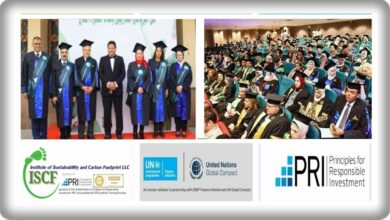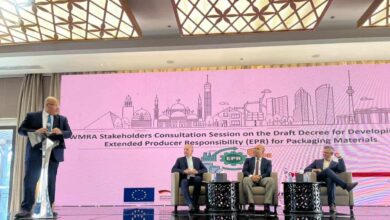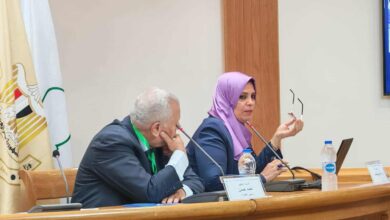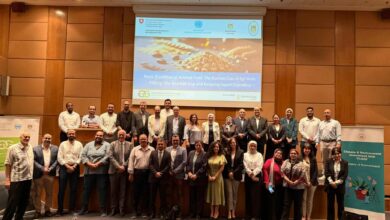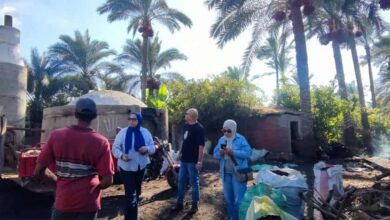Air pollution exceeds smoking in deaths, and an urgent UN call to address the clean cooking crisis in Africa
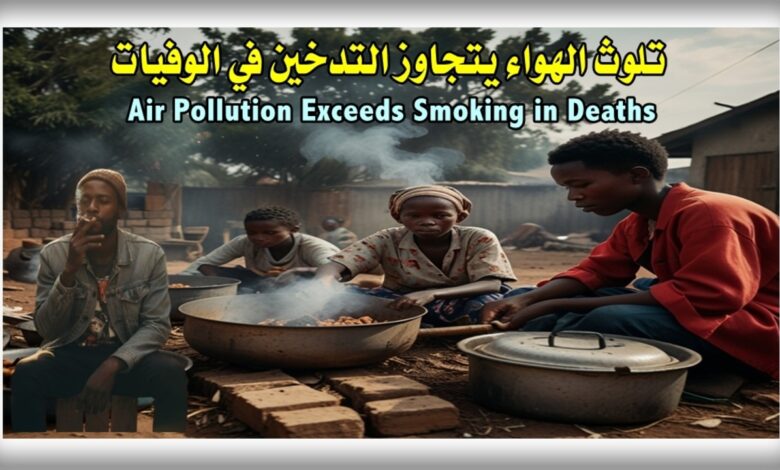
By: Ahmed Abdel Halim
Air pollution is currently the second-largest risk factor for death globally, surpassing the annual number of premature deaths caused by smoking. Recognizing the seriousness of this “silent killer” has led to a global call to action by the United Nations to address this existential crisis. This crisis stems from two main sources: indoor pollution resulting from the reliance of more than 2.3 billion people on polluting cooking fuels, and the dual threat posed by the tobacco industry to health and the environment. International reports confirm that containing this catastrophe requires comprehensive global action focused on increasing funding and integrating air quality solutions into sustainable development plans.
The danger of air pollution.
Experts confirmed in a “Global Call to Action,” launched at a high-level side event of the United Nations General Assembly, that air pollution has now become the single largest risk factor to public health. Breathing polluted air indoors and outdoors contributes to premature deaths that exceed those associated with smoking. About one in nine people worldwide breathe unsafe air.
These warnings are supported by prominent studies, including one published in the European Heart Journal in 2019 (Leleveld et al.) and the journal Cardiovascular Research in 2020, which indicate that air pollution causes approximately 8.8 million premature deaths annually worldwide, most of which are from cardiovascular disease. This figure significantly exceeds the annual deaths caused by smoking (7.2–8 million deaths), while the 2024 State of Global Air report indicated that pollution killed 8.1 million people in 2021. The call emphasizes the importance of addressing indoor pollution, especially since approximately two billion people worldwide, including 960 million in sub-Saharan Africa, lack access to clean cooking solutions and rely on polluting fuels such as biomass and kerosene.
Tobacco: A Dual Threat to Health and the Environment.
The threat is not limited to polluting cooking fuels; the danger posed by tobacco smoking is also highlighted, not only to human health but to the environment. According to the World Health Organization’s 2022 report “Tobacco: Poisoning Our Planet,” this industry causes significant environmental damage; its carbon footprint is equivalent to one-fifth of the carbon dioxide produced annually by the commercial aviation sector, and it contributes to deforestation and water consumption. Furthermore, cigarette butts are the most common form of microplastic pollution globally, with billions of butts containing toxic substances being dumped into the environment, poisoning water and marine life. Reducing smoking would also be a major win for health and the environment, emphasizing the collaboration between the United Nations Environment Programme (UNEP) and the World Health Organization Framework Convention on Tobacco Control (WHO) on this issue.
International reports support the call.
Reports from the World Health Organization (WHO) confirm that air pollution, both indoor and outdoor, kills millions of people annually. They indicate that indoor pollution from polluting cooking fuels caused an estimated 3.2 million deaths in 2021, most of them in low- and middle-income countries, exceeding the number of deaths associated with smoking. Studies from the World Bank and the Center for Research on Energy and Clean Air (CREA) highlight the staggering economic costs of this crisis and emphasize the urgent need to transition to clean cooking solutions. The COP report to the UN Framework Convention on Tobacco Control also directly links the tobacco industry and its production processes to deforestation, water consumption, and carbon emissions, supporting data on the significant environmental impact of this industry. Dr. Inger Andersen, Executive Director of the United Nations Environment Programme (UNEP), emphasized the need to address the “deadly twin” of air pollution and climate change together. She called for working with African countries to reduce emissions. UNEP reports, such as “Air Pollution and Development in Africa,” agree that rising pollution levels on the continent represent a “looming problem” that threatens economic development and increases premature deaths.
The need for financing and mainstreaming climate action.
The Arab Bureau for Youth and Environment (AOYE), as a member of the Arab Network for Environment and Development (RAED), reiterates the paramount importance of air quality as a cross-border health and development issue. This issue aligns with the Bureau’s priorities in supporting regional efforts towards a green transformation.
Dr. Emad El-Din Adly, President of the Arab Bureau for Youth and Environment, emphasized that the discovery that air pollution deaths exceed smoking is a wake-up call that requires immediate action at various levels. He noted that this has become imperative, calling for accelerating the transition away from fossil fuels and moving towards a sustainable energy transition. He also emphasized the importance of increasing investment in clean energy solutions and enhancing energy efficiency in industry, transportation, and buildings. He also emphasized the importance of building on national efforts to improve transportation systems and make them sustainable.
He also pointed out that the Arab Bureau for Youth and Environment is actively working to raise awareness of the importance of rationalizing energy consumption and reducing the use of unnecessary devices. By designing and implementing initiatives that contribute to promoting the use of public transportation, bicycles, and walking instead of private cars whenever possible, and implementing awareness-raising activities on how to properly dispose of, separate, and recycle waste. Also, leading tree and plant planting campaigns to increase green spaces, as part of contributing to the implementation of the presidential initiative to plant 100 million trees.
At the regional and international levels, Dr. Emad El-Din Adly stressed the need to enhance Arab and international cooperation to secure adequate funding, implement strict air quality standards, and integrate addressing indoor and outdoor pollution sources into sustainable development plans. He considered technological solutions and renewable energy to be key to achieving the goal of “clean air for all.”
The Cooking and Financing Crisis
The global air pollution crisis is exacerbated by the deterioration of air quality in Africa, particularly in the sub-Saharan region, where an estimated 2.3 billion people worldwide still lack access to clean cooking solutions and rely on polluting fuels such as biomass and kerosene, which cause serious indoor pollution.
The World Health Organization confirms that this indoor pollution kills 3.2 million people annually. Although the number of people deprived of clean cooking continues to grow in this region (recent studies from Rwanda and Kenya have shown that schools record fine particulate matter levels more than 19 times higher than WHO standards in kitchens), addressing these health and environmental challenges faces a major obstacle: a severe funding gap. Analysis by the Climate and Clean Air Coalition (CCAC) confirms that international development support allocated to combating air pollution does not exceed 1% of total aid, significantly hindering the ability to provide the clean cooking solutions and infrastructure needed to achieve the goal of “clean air for all.”
The Funding Gap and the Need for Global Action.
Efforts to combat air pollution face a major financial hurdle. Reports from international bodies and the Climate and Clean Air Coalition (CCAC) reveal that international development support allocated to this area does not exceed 1% of total global aid. This severe funding gap significantly hinders the ability to implement comprehensive solutions to combat this silent killer. Therefore, there is an urgent need to increase funding for air pollution control and effectively integrate it into climate action priorities and sustainable development plans.
Dr. Rosie Childs, Global Head of Advocacy at the Clean Air Fund, noted that air pollution appears to be significantly underfunded, especially given its massive impact on mortality and contribution to climate change. She noted recent Clean Air Fund reports, such as the “State of Air Quality Financing in Africa 2022,” which confirmed that Africa receives a negligible share (3.7% of total global air quality financing between 2015 and 2021) despite being responsible for 26% of global deaths from outdoor air pollution.
Joint reports (UNEP and CPI).
The Climate Policy Initiative (CPI) and the United Nations Environment Programme (UNEP) have jointly reported (such as the 2023 Climate Finance Report) that Africa is responsible for only 4% of global emissions, yet it is the most affected. Yet, its share of global climate finance flows only exceeds 5-7%, creating a huge financing gap (estimated at $130 billion annually until 2030, according to the African Development Bank) that limits the continent’s ability to adapt and combat pollution.
Main Challenges
In addition to the lack of financing, the main challenges to achieving the “clean air for all” goal are concentrated in four key areas: First, the clean cooking crisis, particularly in sub-Saharan Africa; second, the increasing outdoor pollution from industry, transportation, agriculture, and forest fires; and third, the dual threat of the tobacco industry, which represents an environmental, economic, and social obstacle affecting health and the planet. Addressing these interconnected challenges requires urgent and comprehensive action at all levels.
Proposed Solutions.
The solution requires adopting comprehensive international action focused on increasing financing, implementing strict air quality standards, and integrating pollution management into climate action plans. This is in addition to accelerating the transition to clean cooking solutions, such as electric cooking, renewable energy, and sustainable transportation. It is also important to enhance international and regional cooperation and dismantle criminal networks associated with human trafficking in the context of migration affected by environmental change.
It is worth noting that the primary goal of international efforts must focus on increasing international financing allocated to combating air pollution and integrating it into climate action priorities, to bridge the critical gap in support.




